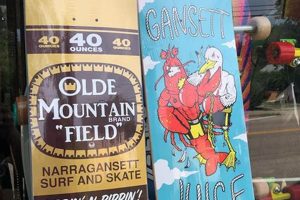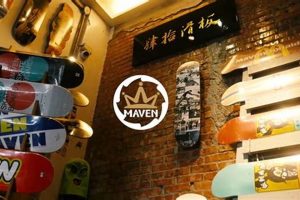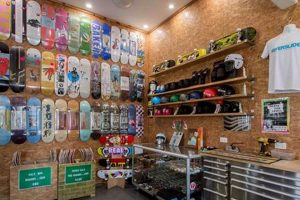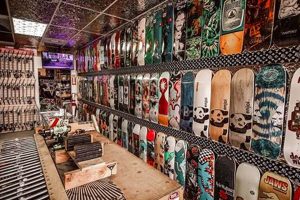Retail establishments specializing in skateboarding equipment, apparel, and related services within a specific metropolitan area are essential resources for skateboarders. These businesses provide products such as skateboards, protective gear, shoes designed for skateboarding, and specialized tools. For example, an individual seeking a new deck or replacement wheels would visit such a location.
These local businesses foster community among skateboarding enthusiasts, offering expertise and support. Their existence supports the skateboarding culture by providing access to necessary equipment and acting as hubs for information on local skate spots and events. Historically, these shops have played a significant role in the growth and evolution of skateboarding by introducing new technologies and trends to their local scenes.
The following sections will delve into specific aspects related to these specialized retail locations, including their offerings, community impact, and factors influencing their success.
Essential Guidance from Local Skateboarding Retailers
This section provides valuable advice from establishments within the Atlanta metropolitan area specializing in skateboarding. This guidance focuses on enhancing the skateboarding experience, ensuring safety, and promoting informed purchasing decisions.
Tip 1: Prioritize Safety Equipment: Always wear appropriate protective gear, including a helmet, knee pads, elbow pads, and wrist guards. Consistent use of safety equipment can significantly reduce the risk of injury during falls and collisions.
Tip 2: Select the Correct Skateboard Size: Choose a skateboard deck width based on shoe size and riding style. Smaller decks are generally preferred for technical street skating, while wider decks offer stability for transition riding and larger skaters.
Tip 3: Inspect Equipment Regularly: Routinely check the skateboard for loose trucks, worn wheels, and any signs of damage. Prompt replacement of worn or damaged components can prevent accidents and maintain optimal performance.
Tip 4: Utilize Appropriate Footwear: Employ skateboarding-specific shoes featuring flat, grippy soles and durable construction. These shoes provide enhanced board feel and protection against wear and tear from griptape.
Tip 5: Learn Fundamental Skills: Master basic skateboarding techniques such as pushing, balancing, and stopping before attempting more advanced maneuvers. A strong foundation in fundamentals promotes safer and more progressive skill development.
Tip 6: Research Local Skateboarding Ordinances: Familiarize yourself with local regulations pertaining to skateboarding in public spaces. Adhering to these rules helps avoid fines and promotes positive relationships with the community.
Tip 7: Seek Advice from Experienced Skaters: Engage with the local skateboarding community and seek guidance from experienced individuals. Learning from others can accelerate skill development and provide valuable insights into skateboarding culture and etiquette.
These tips emphasize the importance of safety, equipment maintenance, and skill development for a fulfilling skateboarding experience. Integrating this advice into skateboarding practices can improve performance and reduce the likelihood of injuries.
The next part of this article explores community events and local skate parks.
1. Local Equipment Availability
The accessibility of skateboarding equipment within the Atlanta metropolitan area is directly contingent upon the presence and function of skate shops. These establishments provide a crucial service by offering a physical location where customers can purchase, inspect, and receive guidance on skateboarding-related products.
- Immediate Access to Gear
Local shops provide immediate access to skateboards, components (wheels, trucks, bearings), and protective gear. This eliminates the delays associated with online ordering, allowing skaters to quickly replace broken parts or upgrade their setups. This immediacy is particularly important when facing imminent skateboarding opportunities, such as impromptu sessions or scheduled events.
- Tangible Product Evaluation
Physical retail locations enable customers to evaluate products firsthand. They can inspect the quality of a skateboard deck, test the responsiveness of trucks, or try on protective gear for proper fit. This tactile experience is essential for informed decision-making and ensuring the suitability of equipment for individual needs and preferences. The ability to physically assess products reduces the likelihood of dissatisfaction and returns.
- Specialized Inventory Selection
Local retailers curate their inventory based on local skateboarding trends, terrain, and preferences. They often stock specialized products tailored to the needs of the local skateboarding community, which may not be readily available from larger online retailers. This specialization ensures that skaters have access to the equipment that best suits the unique characteristics of the Atlanta skateboarding scene.
- Support for Local Economy
Purchasing equipment from a local skate shop directly supports the local economy and contributes to the sustainability of the skateboarding community. Revenue generated by these businesses circulates within the local area, creating jobs and funding other local initiatives. Choosing local retailers over national chains or online vendors demonstrates a commitment to supporting the local skateboarding ecosystem.
The availability of equipment through Atlanta-based skate shops is critical for supporting the skateboarding culture and providing convenient access to necessary products. These establishments serve as vital resources for skaters of all skill levels, contributing to the growth and vibrancy of the local skateboarding scene.
2. Community Hub
Establishments offering skateboarding equipment and services within the Atlanta metropolitan area frequently function as pivotal community hubs. Their role extends beyond mere retail, encompassing the facilitation of social interaction, skill development, and the propagation of skateboarding culture.
- Organized Events and Gatherings
Many shops organize skateboarding-related events, such as competitions, demonstrations, and group skate sessions. These events provide opportunities for skaters of all skill levels to connect, share experiences, and learn from one another. These gatherings foster a sense of belonging and contribute to the overall vibrancy of the local skateboarding scene. An example is a shop sponsoring a “best trick” contest at a local skate park, drawing participants and spectators from across the region.
- Skill Development and Mentorship
Some locations offer skateboarding lessons or workshops, providing structured learning environments for beginners and intermediate skaters. More experienced individuals often mentor less experienced skaters, sharing knowledge and techniques. This mentorship helps to improve skateboarding skills and promotes a supportive learning environment. For instance, a shop employee might provide informal coaching to a younger skater struggling with a particular trick.
- Information Exchange and Networking
These establishments serve as central points for information regarding local skate spots, upcoming events, and skateboarding-related news. Skaters often gather at shops to discuss skateboarding, share tips, and network with other members of the community. This information exchange facilitates the dissemination of knowledge and strengthens the social connections within the skateboarding community. A shop bulletin board might display flyers for upcoming competitions or publicize the opening of a new skate park.
- Safe and Inclusive Environment
Successful businesses cultivate a welcoming and inclusive atmosphere for all skaters, regardless of skill level, gender, or background. This creates a sense of belonging and encourages participation from a diverse range of individuals. A shop that actively promotes inclusivity and respect fosters a positive and supportive community environment. This could involve implementing policies that discourage discrimination and promoting female skaters within the community.
The role of these specialized businesses in Atlanta extends beyond the provision of skateboarding equipment. They actively contribute to the development and maintenance of a vibrant and supportive community, fostering social connections and promoting the growth of skateboarding culture. Their existence is vital for the continued flourishing of skateboarding in the region.
3. Expert Knowledge Provision
Expert knowledge provision is a foundational element contributing to the value proposition of skate shops within the Atlanta, Georgia, metropolitan area. These businesses, to remain competitive and relevant, offer expertise beyond the mere transaction of goods. The provision of informed guidance directly impacts customer satisfaction, safety, and the overall growth of the skateboarding community. For instance, a knowledgeable employee can assess a customer’s skating style, experience level, and intended use to recommend a skateboard setup that optimizes performance and reduces the risk of injury. This level of personalized service is often unattainable through online retailers, solidifying the importance of specialized local businesses.
The practical significance of this knowledge extends to equipment maintenance and repair. Employees with expertise in skateboard mechanics can diagnose problems, offer solutions, and perform repairs, extending the lifespan of skateboarding equipment and preventing costly replacements. Furthermore, skate shops often serve as informal educational centers, providing information on skateboarding techniques, local skate spots, and skateboarding etiquette. For example, a shop employee might offer advice on how to properly tighten trucks or replace bearings, empowering customers to maintain their own equipment and further develop their skills. This builds customer loyalty and strengthens the shop’s position as a trusted resource within the community.
However, challenges exist in consistently delivering high-quality expert knowledge. Employee training and retention are crucial. Shops must invest in ongoing training to ensure that employees remain knowledgeable about the latest products, techniques, and safety standards. Addressing these challenges and prioritizing expert knowledge provision is essential for skate shops in the Atlanta area to thrive and continue serving as valuable resources for the local skateboarding community.
4. Gear Maintenance
Gear maintenance represents a critical aspect of skateboarding, influencing both performance and safety. Establishments offering skateboarding equipment within the Atlanta metropolitan area often provide services and products related to this essential function, establishing a direct link between gear maintenance and the availability of resources within the local skateboarding community.
- Component Inspection and Assessment
Regular inspection of skateboard components, including wheels, trucks, bearings, and decks, is crucial for identifying potential issues before they escalate. Local businesses provide expertise in assessing wear and tear, detecting damage, and recommending appropriate replacement parts or repairs. For instance, a technician can identify worn bearings that are affecting wheel spin and recommend a suitable replacement, thereby maintaining optimal performance.
- Bearing Maintenance and Replacement
Bearings are essential for wheel rotation and overall speed. They require periodic cleaning, lubrication, and eventual replacement. Businesses offering skateboarding equipment typically stock a variety of bearings and provide services for cleaning and lubricating them. Failure to maintain bearings can result in reduced speed, increased friction, and potential damage to other components.
- Truck Adjustment and Repair
Trucks affect steering and stability. Proper adjustment and maintenance are necessary to ensure responsiveness and prevent wobbling. Retailers may offer services for tightening or loosening trucks, replacing bushings (the rubber pieces that affect turning), and repairing damaged baseplates. These adjustments significantly impact the riding experience and safety.
- Deck Care and Replacement
Skateboard decks are susceptible to wear and tear from impact and abrasion. While damage to the plies of wood cannot be repaired, shops can advise on when a deck is no longer safe to use and recommend a suitable replacement based on the skater’s style and preferences. Prompt replacement of a damaged deck prevents potential accidents and ensures consistent performance.
The availability of gear maintenance services and products within Atlanta-area skate shops is integral to the longevity of skateboarding equipment and the safety of skateboarders. The expertise and resources provided by these businesses contribute directly to the overall quality of the skateboarding experience.
5. Skateboarding Culture Promotion
Skate shops in Atlanta, Georgia, function as critical nodes in the promotion and preservation of skateboarding culture. Their role extends beyond retail transactions to encompass activities that nurture community, foster creativity, and sustain the overall skateboarding ecosystem. A direct relationship exists between these businesses and the vitality of skateboarding within the region; their efforts have a tangible effect on participation rates, skill development, and the collective identity of the local skateboarding scene.
Several examples illustrate this connection. Many shops sponsor local skateboarding events, providing financial support and logistical assistance to competitions, demonstrations, and skate jams. This sponsorship not only elevates the visibility of skateboarding but also provides opportunities for skaters to showcase their talents, connect with peers, and inspire younger generations. In addition, skate shops often collaborate with local artists and designers to create custom skateboard decks, apparel, and accessories. This collaboration fosters creativity, supports local talent, and infuses the skateboarding culture with a unique Atlanta flavor. By displaying local skateboarders and their tricks on videos, skate shops have promoted individuals and their community.
Understanding the role of skate shops in promoting skateboarding culture is essential for appreciating their broader significance to the community. However, challenges persist. Economic pressures, such as competition from online retailers and fluctuating consumer trends, can threaten the viability of local shops and their ability to invest in cultural initiatives. Nevertheless, the continued commitment of Atlanta-area skate shops to promoting skateboarding culture remains crucial for sustaining this vibrant and dynamic subculture for future generations. Without such commitments from the shop owners, Atlanta skateboarders wouldn’t get the recognition they deserve.
Frequently Asked Questions
The following section addresses common inquiries regarding establishments specializing in skateboarding equipment and services within the Atlanta metropolitan area. This aims to provide clarity and comprehensive insight into the role and function of these businesses.
Question 1: What types of products are typically available at these retail locations?
Products typically include complete skateboards, skateboard decks, wheels, trucks, bearings, grip tape, hardware, skateboarding shoes, protective gear (helmets, knee pads, elbow pads, wrist guards), and skateboarding-related apparel and accessories.
Question 2: Beyond products, what other services might one expect from a skate shop?
Services may include skateboard assembly, bearing cleaning and lubrication, truck adjustment and repair, grip tape application, and expert advice on equipment selection and maintenance.
Question 3: How do these establishments contribute to the local skateboarding community?
These businesses often sponsor local skateboarding events, support local skaters, provide a gathering place for the skateboarding community, and promote skateboarding culture through product selection and engagement with customers.
Question 4: Are these stores typically staffed by individuals knowledgeable about skateboarding?
Yes, reputable establishments generally employ individuals with skateboarding experience and knowledge, enabling them to provide informed advice and recommendations to customers.
Question 5: How can one locate reputable places in the Atlanta area?
One can utilize online search engines, social media platforms, and word-of-mouth recommendations from other skaters to identify reputable shops in the Atlanta area. Additionally, checking online reviews and seeking referrals from local skateboarding organizations can be helpful.
Question 6: What factors differentiate a reputable shop from a less desirable one?
Factors include product quality, staff knowledge, customer service, community involvement, and overall reputation within the local skateboarding scene. A reputable shop will typically prioritize customer satisfaction and actively contribute to the growth and well-being of the skateboarding community.
In summary, skate shops offer more than just equipment; they provide expertise, community support, and a tangible connection to the skateboarding culture within Atlanta.
The article will transition towards the key elements of a successful skating shop.
Conclusion
This article has explored the multifaceted nature of retail establishments specializing in skateboarding within the Atlanta, Georgia, metropolitan area. The analysis encompassed equipment availability, community building, expert knowledge dissemination, gear maintenance resources, and the promotion of skateboarding culture. These businesses serve as essential nodes within the local skateboarding ecosystem, contributing significantly to its vibrancy and sustainability.
The continued success of these establishments hinges upon their ability to adapt to evolving market dynamics, prioritize customer needs, and foster strong relationships within the skateboarding community. The presence of thriving skate shop atlanta ga represents a vital asset, supporting not only individual skaters but also the broader cultural landscape of the city. Their existence ensures the continued growth and accessibility of skateboarding for future generations.







